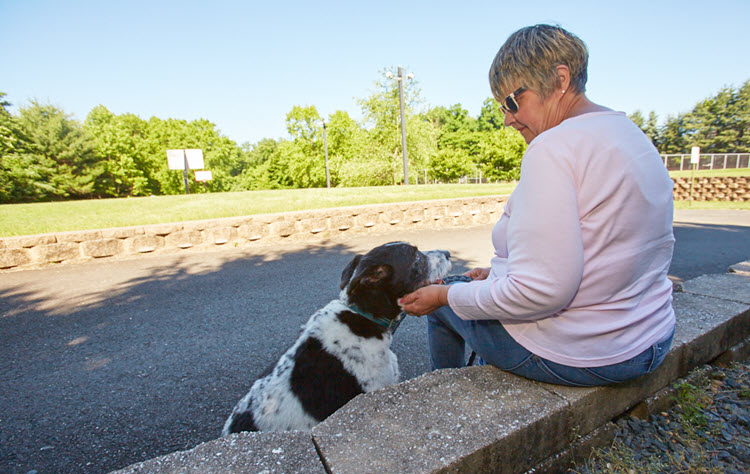Which is why I talked to my doctor about an antidepressant.
Normally, I’m a person who looks at life from a glass half full perspective. I look for and find the bright side of situations because I believe we can choose happiness. But choosing happiness takes energy, energy which I don’t have at the moment.
I know I’m not the only one struggling. The social isolation brought on by the pandemic, the anxiety of trying to keep loved ones safe, the economic uncertainty and the daily dose of bad news is being felt by friends, family and colleagues.
In normal times (pre-coronavirus) studies have shown that anywhere between 20% and 70% of caregivers suffer from depression. That is twice the rate of the general population. I’m not saying caregiving causes depression, nor do all caregivers go through depression. But the stress and anxiety that come with caregiving can contribute to it, especially with a family genetic disposition.
I do have a family genetic predisposition to depression and research shows that a stressful or unhappy life event can trigger the onset of an episode. Enter COVID-19. At the start of the coronavirus, my mother and my dog had health issues and as caregiver to both it’s been the perfect storm.
Mom
- Mom started off our quarantine with a wound that required many doctor visits and vigilant care.
- A month later, a severe eye infection required that I move in with her for a week. Hourly eye drops 24X7 for several days required my taking on the nighttime routine so her caregiver could sleep. We continue to battle the lesion on her eye and weekly visits to the eye doctor will be required for the foreseeable future.
- Both events caused her to eat badly, requiring multiple adjustments to her insulin.
Josh
- Josh is losing the use of his back legs due to arthritis. I have been here before with other beloved dogs and it doesn’t end well.
- Then there are the other issues we identified last January and since then he has lost weight.
- Every day we play the game “What will Josh eat today?”.
“The In Between Time”
I’m in that weird state of waiting for the other shoe to drop. I first identified this after Dad was diagnosed with congestive heart failure. For me, it is when you can see that a loved one has lost abilities and you wonder what is next. This is true of Mom and Josh, and it is anxiety provoking.
But neither one is down and out. Now that we have the eye infection under control, Mom is getting back to normal. Josh still likes to go for walks, sit in my lap at night for some cuddles and when I find the right food, he is enthusiastic about eating.
I know the health issues could have been more severe. I am also fortunate that Mom is not living with dementia, which would greatly increase my likelihood of a depressive episode. But everyone is different and has a different breaking point. All this has taken a huge toll on me. It’s hard to concentrate. It’s hard to focus on work. I’m not sleeping well. I lack the energy to get out of bed or get simple tasks done around the house. I’m irritable and easily angered, none of which is normal for me.
Feelings of anger, anxiety, sadness, isolation and exhaustion are all classic symptoms of depression. My normal self-care routine of journaling, seeing friends and even taking Josh on long walks were no longer available or working for me. Finding the energy to start something different was beyond me. Add to that using food as a soother and I knew I needed help.
Making the decision to talk to my doctor and saying yes to a low dose antidepressant was not an easy one, especially given the potential side effects. Given the side effects, I have told close friends that I am on medication and asked them to watch out for anything out of the norm for me like weird dreams or conversations and to give me a heads up if it happens. So far almost two weeks in, it is making a difference. My head is clearer, I’m not as exhausted and quick to anger.
Admitting you need help for mental health is still taboo. But I know that depression runs in our family. I know that taking medication is more successful when you combine it with therapy, so I’m going to follow my doctor’s advice and get counseling. Too many people feel guilty or ashamed about not being able to deal with it alone, which is why I want to be honest about what I’m going through and why I wrote this article.
If life right now feels overwhelming, I hope you will consider getting help. Then let me know how you are doing.


Wishing you ease through this “perfect” storm. You make very valid points and I do hope people pay attention and reach out for help without guilt or shame… In fact, reaching out for help is a true sign of strength, just as self-care is a sign of self-respect and self-esteem, NOT weakness. #andwebreathe… because sometimes that’s all we can do…
Loren,
Yes, “#andwebreathe…because sometimes that’s all we can do…” Wise words to live by. Thank you.
Loved the article. As I often tell my cancer patients, sometimes you look in the coping drawer, and the right tool for the job is not there- or- on a scale of 1-10, some things add up to a 15. The medication is there to HELP. It doesn’t solve everything, but it can help you to cope and manage this uncertainty a bit more. Thank you for sharing this very real struggle with those you love.
Sharon,
I love the analogy of a coping drawer, with your permission, I would like to use it.